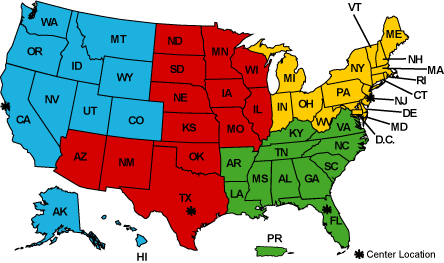|
|
|
|||||||||||

|
|||||||||||||||||||||||||||||||||||||||||||||
TB Notes NewsletterReturn to TB Notes 3, 2006 Main Menu This is an archived document. The links and content are no longer being updated. No. 3, 2006Regional Training and Medical Consultation Centers’ TB Education and Training Needs Assessments: Key Cross-Regional Findings
In 2005, CDC funded four Tuberculosis (TB) Regional Training and Medical Consultation Centers (RTMCCs):
The RTMCCs are regionally assigned to cover the 50 states, the District of Columbia, New York City, Puerto Rico, and seven other U.S. jurisdictions in the Pacific and Caribbean. The goal of the RTMCCs is to build TB training capacity and to provide medical consultation within each Center’s region. As part of their first year activities, the RTMCCs conducted extensive needs assessments to determine TB education and training resources and needs in their regions. MethodsEach RTMCC developed its own strategy and tools to conduct its assessments; however, they all specifically focused on obtaining information on barriers to training; distance and technological training capabilities; preferred training topics and formats; awareness of existing TB resources; as well as preferred product topics and formats. The methods for the need assessments varied across regions but included
The target audiences for the needs assessments included
Cross-Regional Findings Although the results from the needs assessments varied by region, below are some common cross-regional findings. Barriers to Training Some of the barriers to training included factors such as the lack of staff coverage while employees were attending a training; travel restrictions due to limited funds and policies; lack of awareness of trainings; poor accessibility to trainings due to isolated geography; and limited technological capabilities. Preferred Training Formats Live, in-person training at workshops and conferences ranked highly as a preferred training format among most needs assessment respondents. Other preferred formats included in-service meetings and written/self-study format. Telephone and audio-conferencing ranked low as a preference among respondents. The preference for online or computer-based trainings varied across regions and by profession. State TB program staff ranked preference for use of distance-learning technologies (CD ROMs, online courses, and web conferencing) higher than did frontline TB staff. Distance and Online Learning Capabilities Technological capabilities for distance and online learning varied across the regions; however, findings suggested that video-conferencing and satellite capabilities are limited throughout the country. Moreover, while most state-level TB program staff have access to computers and the Internet, local level TB staff have limited access. Training Topics Training topic priorities (not listed in rank order) varied by region and occupation, but identified priorities included
Awareness of Existing TB Resources and Products Awareness of existing TB training and education resources differed between central level TB staff and frontline staff. Central level TB staff had a higher awareness of resources such as The TB Education and Training Resources Website (www.findtbresources.org), the TB Education and Training Network (TB-ETN), and the TB-Educate electronic mailing list compared to frontline TB staff. Lower awareness of such resources among frontline TB staff could be related to their limited access to the Internet. In terms of awareness of existing training products, the CDC Core Curriculum and Self-Study Modules were widely utilized, as were products from the former Model Centers. Product Topics Desired Products that help synthesize information in the new CDC guidelines (e.g., QuantiFERON-TB Gold Test, Contact Investigations, and Infection Control) in an easy-to-understand manner were identified as a need. Other desired products included a basic TB information packet for new employees, cultural competency materials, pocket reference lab guide, and products targeted towards private providers, homeless shelter staff, and infection control materials. In addition, patient education materials in low-literacy and multiple languages were also requested. Preferred Product Formats Although having access to materials online was considered important, findings also suggested that most respondents preferred printed materials to CD ROMs and other online-only resources. Furthermore, preference was high for products to be developed in quick and easy-to-read, easy-to-use formats such as reference cards, checklists, toolboxes, and videos. Conclusions The needs assessment provided the RTMCCs with information that will lead to the development of targeted trainings and products for each region. Moreover, similar findings across RTMCC regions will provide opportunities for cross-collaboration for training and product development. To address barriers to trainings and ensure awareness and access to products, the RTMCCs should consider
For detailed needs assessment reports for each region, please contact the RTMCCs (see below).
Submitted by Amera
Khan, MPH
Last Reviewed: 05/18/2008 |
||||||||||||||||
|
If you would like to order any of the DTBE publications please visit the online order form. You will need Adobe Acrobat™ Reader v5.0 or higher to read pages that are in PDF format. Download the Adobe Acrobat™ Reader. If you have difficulty accessing any material on the DTBE Web site because of a disability, please contact us in writing or via telephone and we will work with you to make the information available. Division of Tuberculosis Elimination
Centers for Disease Control & Prevention |


 3180 18th Street, Suite 101
3180 18th Street, Suite 101 2303 SE Military Drive,
2303 SE Military Drive, 225 Warren Street
225 Warren Street 1329 SW 16th Street
1329 SW 16th Street